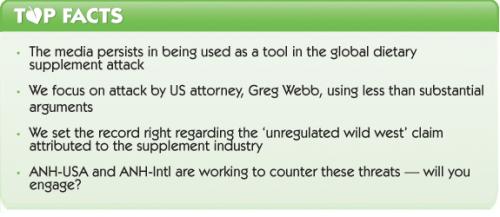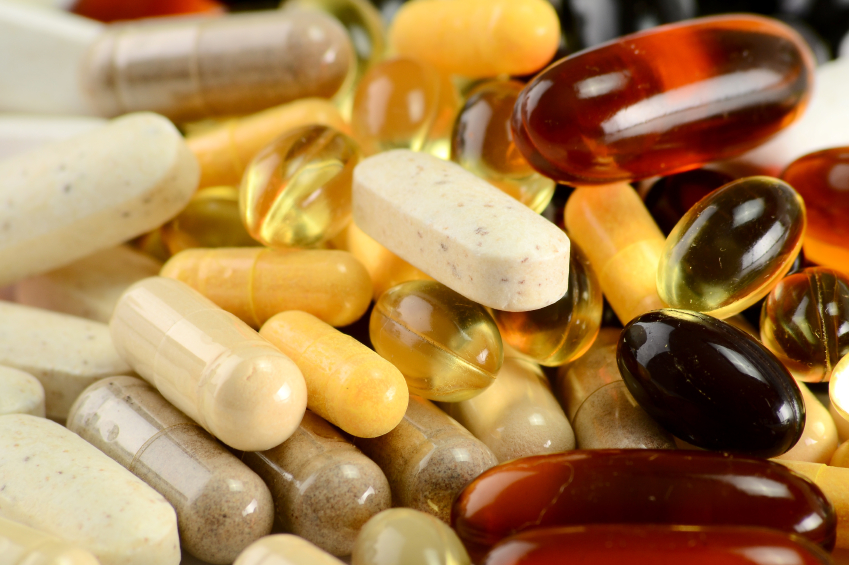People throughout the world are increasingly shunning mainstream medicine in favour of more natural approaches to improving their health and wellbeing. Not coincidentally, the attacks on natural healthcare continue to mount. Media attacks – such as comparisons of the food (dietary) supplement industry with an unregulated ‘Wild West’ – are only one side of the story. They reflect a wider threat from certain quarters of the scientific, regulatory and media establishments, which must be resisted at all costs.

Bad science spreads unchallenged in the media
It appears all too easy for commentators like Greg Webb in the Charlottesville Legal Examiner to paint dietary supplements in a bad light. Since Mr Webb is an attorney, one is entitled to expect scrupulous information gathering and fact checking on his part. So let’s briefly examine some of his claims.
First off, let’s remind ourselves that food (dietary) supplements represent nothing other than concentrated sources of nutrients delivered in dose form. Webb initiates his criticism of supplements by taking on green tea (Camellia sinensis) extracts: “The amount of extract in these pills is not regulated,” he claims. “Catechin, the potent antioxidant found in green tea, can be quite dangerous when taken in larger doses, leading to toxicity of the liver.” But of course dietary supplements in the USA are, in fact, regulated by the Dietary Supplement Health and Education Act (DSHEA). Section 2(14) of DSHEA recognises that “Dietary supplements are safe within a broad range of intake, and safety problems with the supplements are relatively rare” – a state of affairs confirmed by the report presented by the author in support of his own assertion. “Given the wide spread consumption of green tea and its extract in various HDS [herbal and dietary supplements], liver injury from green tea is rare,” it admits. The report goes on to note that liver toxicity in people taking green tea extracts occurred in the context of “environmental features such as obesity, fasting or glutathionine depletion”. Finally, the report points to removal from the market by French and Spanish authorities of a green tea extract called Exolise as the most damning evidence against green tea extracts – overlooking the fact that the authorities acted on shockingly flimsy evidence. A more comprehensive analysis by the US Pharmacopoeia found that any potential safety concerns can easily be dealt with by appropriate labelling.
The hollow claim: ‘Supplements are unregulated’
Elsewhere, Mr Webb wheels out a highly one-sided article from the New York Times to push the idea that some kind of pre-market approval system is required for food supplements in the USA. Such a scheme would be similar to the Food Supplements Directive (FSD) in the European Union (EU), and it’s not hard to tell that US regulators are in close communications with EU ones. Both the New York Times article and Mr Webb’s piece claim that, because supplements are “largely unregulated,” consumers can’t know what’s in the products they are buying and are therefore at risk. Yet they both overlook the fact that US supplement manufacturers must comply with stringent Current Good Manufacturing Practice (CGMP) standards for their products. The US Food and Drug Administration (FDA) has full powers to prosecute companies who flout CGMP rules, for example by adulteration with pharmaceuticals or contamination. If there is a problem, it’s one of lack of enforcement rather than lack of legislation: as our colleagues at ANH-USA point out, “FDA approval does not, and cannot, prevent contamination or adulteration. It certainly hasn’t done so for FDA-approved drugs!”
Frankly, given the shallowness of his analysis, we’d be extremely worried if Mr Webb were our lawyer.
Europe’s regulatory sledgehammer
Considering that food supplements are among the safest substances we put into our mouths, the ever-tightening noose of regulation threatening them globally is akin to the proverbial sledgehammer cracking a nut. In Europe, a complex set of interlocking, draconian laws creates a hugely challenging situation for not only food supplements, but the entire natural health industry.
EU pattern looms in the USA, Canada and Australasia
As we’ve pointed out, this EU model is being introduced step by step around the world, including in the USA and in Canada.
The FDA appears to be doing its level best to steer the USA in a similar direction to the EU, only using different methods. Despite the fact that DSHEA is apparently working well to regulate supplements, further legislation is rightly constantly being resisted through the actions of organisations like ANH-USA and its thousands of grassroots supporters. Senator Durbin’s Dietary Supplement Labeling Act, for example, would shift things in the USA toward a premarket approval system for supplements, and ‘New Dietary Ingredient’ (NDI) legislation is being proposed which is very similar to the EU’s Novel Food Regulation. Moves are also being made to widen the scope of what is considered ‘commercial communication’, contravening the First Amendment to the US Constitution.
EU-style elements are also being introduced in Australia and New Zealand.
Codex takes the threats global
The intergovernmental Codex Alimentarius Commission sets guidelines and standards to ensure ‘fair trade practices’ and consumer protection in the global food trade. Unelected, bureaucratic and skewed toward corporate interests, Codex is substantially responsible for moves toward regulation of health claims and setting of maximum and minimum permitted levels (MPLs) for vitamins and minerals in food supplements in Europe.
ANH action and solutions to counter these threats
Your support helps the ongoing efforts by ANH-USA and ANH-Intl to counter the bad science and bad law that threatens food supplements and other aspects of natural health. Given that many countries are looking to the EU as a leader in regulation of dietary (food) supplements, here are some of the key challenges being faced in Europe:
- The food/medicine borderline. A very broad definition of a medicine (as is the case in the EU) that has the potential to make almost any product a medicine, especially if it works therapeutically
- The delivery of a product in a form (in terms of its chemical composition or the relative amounts of its constituents) that makes it a ‘novel food’ (in the EU, this means simply that no evidence can be furnished to show it was sold in this form in “significant amounts” before 15 May 1997), so requiring pre-market authorisation
- The classification of botanicals as herbal medicines, therefore requiring a (herbal) medicines license
- Highly restrictive health claims that prevent the commercial communication of health benefits about food supplements
- The harmonisation of maximum and minimum levels of vitamins and minerals in food supplements, the scientific basis of which is now being evaluated by the Dutch independent research organisation TNO following its commissioning by ANH-Intl.
These are all issues that are central to our European work at ANH-Intl. We work to raise awareness of the issues and we work politically, scientifically and legally to re-shape the legislative framework. Last but not least, we use our expertise to help keep businesses in the sector, from clinics to major manufacturers, afloat in the tricky water of the EU.
Natural health, including the use of food supplements, represents the healthcare system of the future. It’s certainly no time to give up on it just because of what you read in the newspapers.








Comments
your voice counts
02 February 2014 at 10:42 am
Big Pharma want to control everything and have lobbied governments using already vast profits. Buying people who are supposed to represent us (and protect us??) is about as low as it gets.
09 February 2014 at 10:21 pm
Regarding Karen Jacob's comment. To understand, and hopefully recognize, how "people who are supposed to represent us (and protect us??)" are thoroughly corrupted, take the U.S. FDA as an example: google/bing "Tougher Supplement Regulation: A Necessity Or Politics? by Rolf Hefti".
14 March 2015 at 12:00 pm
I agree totally that the DSHEA is key in setting supplement regulations. We all know too much of even a good thing can be unhealthy. Just as we all know that all prescribed medicines can and usually do have negative side effects - that is why a doctor's prescription is needed because we are trusting his education to determine that for the health situation of a particular patient the positive effects of the medicine will outweigh the negative ones.
08 February 2016 at 4:25 am
The FDA only is allowed to make sure the supliments are made by good manufacturing methods. This has nothing to do with varifiying if what the companies say are true. FDA does not even look into the claims the companies make whether they are true or false. I look forward to the EU like rules being applied in the USA. As it stands now they can make any claims and not be required to prove them at all. As we have found out just in the last 2 months that FDA dose not even the companies do not know what is in their pills several vitamin where being sold that had zero vitamin in it that was on the label. There are bad lies being told by the food supliments companies. They don't even know for sure what is in the pills they have in the bottles. Now with new evidence coming out of New York the food supliments show just how bad this industry has become it is time to make the companies prove what's in their product and prove and claims they make.
19 March 2016 at 9:50 pm
'They can make any claims and not be required to prove them at all.' Ah, that would be like the pharmaceutical companies whose 'trials' falsify the findings to favour their products. For example, anti depressants, which caused a high number of suicides amongst children ...
12 October 2016 at 9:55 am
Which of your supplement. best clears hepatitis in its beginning stage.
Thank you
Soroti
Uganda
12 October 2016 at 10:00 am
I would love to use the most appropriate supplement as well appraised by consumers.
Your voice counts
We welcome your comments and are very interested in your point of view, but we ask that you keep them relevant to the article, that they be civil and without commercial links. All comments are moderated prior to being published. We reserve the right to edit or not publish comments that we consider abusive or offensive.
There is extra content here from a third party provider. You will be unable to see this content unless you agree to allow Content Cookies. Cookie Preferences